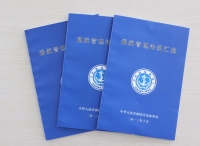中华人民共和国对外国籍船舶管理规则(英文版)
发表于 2015-10-09 16:40
| 法规标题: | 中华人民共和国对外国籍船舶管理规则(附英文) | |
| 发布机关: | 国务院批准,交通部公布 | |
| 发布文号: | 交港字[1979]1606号 | |
| 发布日期: | 1979年9月18日 | |
| 实施日期: | 1979年9月18日 | |
| 时 效 性: | 有效 | |
| 题 注: | 一九七九年八月二十五日国务院批准 | |
RULES OF THE PEOPLE'S REPUBLIC OF CHINA GOVERNING VESSELS OFFOREIGN NATIONALITY
Important Notice: (注意事项)
英文本源自中华人民共和国务院法制局编译, 中国法制出版社出版的《中华人民
共和国涉外法规汇编》(1991年7月版).
当发生歧意时, 应以法律法规颁布单位发布的中文原文为准.
This English document is coming from the "LAWS AND REGULATIONS OF THE
PEOPLE'S REPUBLIC OF CHINA GOVERNING FOREIGN-RELATED MATTERS" (1991.7)
which is compiled by the Brueau of Legislative Affairs of the State
Council of the People's Republic of China, and is published by the China
Legal System Publishing House.
In case of discrepancy, the original version in Chinese shall prevail.
Whole Document (法规全文)
RULES OF THE PEOPLE'S REPUBLIC OF CHINA GOVERNING VESSELS OF
FOREIGN NATIONALITY
(Approved by the State Council on August 25, 1979) and promulgated
by the Ministry of Communications on September 18, 1979)
General Provisions
Article 1
These Rules are formulated in order to safeguard the sovereignty of the
People's Republic of China, maintain the order of ports and coastal
waters, ensure the safety of navigation and prevent the pollution of
waters.
Article 2
All vessels of foreign nationality sailing in the ports and coastal waters
of the People's Republic of China (hereinafter referred to as "vessels")
shall abide by these Rules and all the relevant decrees, stipulations and
provisions of the People's republic of China. Whenever the Harbour
Superintendency Administration set up by the Government of the People's
Republic of China is of the view that it is necessary to conduct
inspection of vessels, the vessels must subject themselves to inspection.
The term coastal waters as used in these Rules refers to the inland waters
and territorial seas of the People's Republic of China and the waters
stipulated by the State to be under its jurisdiction.
Chapter I Port Entry and Exit and Navigation
Article 3
The captain or the ship owner shall, through the China Ocean-shipping
Agency Corporation, one week before the scheduled arrival of his vessel at
a port, fill in the prescribed forms and go through the procedures to
apply for approval of port entry with the Harbour Superintendency
Administration and, 24 hours before the vessel's arrival at the port (or
if the voyage is less than 24 hours, at the time of departure from the
previous port), through the agent company for foreign vessels, report to
the Harbour Superintendency Administration on the scheduled time at
arrival, forward draft, stern draft, and other such conditions. A report
shall be made at any time if any change at the time of arrival is
anticipated. If in the course of its voyage, a vessel has to enter or
return to the port temporarily due to special circumstances such as
mishap, malfunction, or acute illness contracted by its seamen or
passengers, a report shall be made to the harbour Superintendency
Administration in advance.
Article 4
When a vessel goes into or out of a port or sails or changes berths in it,
it shall be guided by a pilot appointed by the Harbour Superintendency
Administration. The specific matters concerning pilotage shall be handled
in accordance with the "Provisions for Pilotage in Ports" promulgated by
the Ministry of Communications of the People's Republic of China.
Article 5
Upon arrival of a vessel at a port, the entry and other relevant reports,
together with the certificate of registry and relevant documents shall be
submitted promptly for examination, and the vessel shall be subject to
inspection. Before a vessel goes out of a port, the exit and other
relevant reports shall be submitted and the vessel may go out only with an
exit permit issued after inspection.
Article 6
All weapons and ammunition on board a vessel shall be kept under seal by
the Harbour Superintendency Administration upon arrival of the vessel at
the port. Radio telegraph transmitters, radio telephone transmitters,
rocket signals, flame signals and signal guns shall only be used in
conditions of emergency; and after such use, reports must be made to the
Harbour Superintendency Administration.
Article 7
It shall be forbidden, inside a port, to shoot, swim, fish or set off
fire-crackers or fireworks or do other acts likely to endanger the safety
and order of the port.
Article 8
The Harbour Superintendency Administration shall be entitled to prohibit a
vessel from going out of the port within a specified period of time, or
order it to suspend its voyage, change its course or return to the port if
the vessel is in any of the following conditions:
1. in an unseaworthy condition;
2. in contravention of the laws or regulations of the People's Republic of
China;
3. having involved in an accident of marine damage;
4. having failed to pay prescribed dues and to provide an appropriate
guarantee therefor;
5. other conditions which call for prohibition of navigation.
Article 9
Vessels sailing in the ports and coastal waters of the People's Republic
of China shall not engage in activities detrimental to the security,
rights and interests of the People's Republic of China and shall abide by
the provisions concerning straits, waterways, navigation lines and
restricted zones.
Article 10
Vessels shall not sail at such speed in ports as to endanger the safety of
other vessels and port facilities.
Article 11
The boats (rafts) attached to vessels shall not be allowed to sail in
ports except for lifesaving purposes.
Article 12
When sailing or changing berths in ports, vessels shall not have their
attached boats (rafts), derricks, gangways, etc. extended over the board
sides.
Article 13
Vessels that have to enter into a port of the People's Republic of China
which is open to foreign vessels for the purpose of taking shelter or
temporary berth shall apply to the Harbour Superintendency Administration
for approval; the application shall include: the ship's name, call sign,
nationality, name of the carrier, port of departure, port of destination,
ship's position, speed, draft, hull colour(s), funnel colour(s) and mark,
and shall take shelter at the specified place.
Vessels that have to take shelter or temporary berth in a place other than
the ports open to foreign vessels of the People's Republic of China shall,
in addition to going through the above procedures for the application for
approval, abide by the following:
1. duly report to the Harbour Superintendency Administration in the
neighbourhood on the anchoring time, position and the time of departure;
2. observe the provisions of the relevant local departments, subject
itself to inspection and enquiry and obey orders;
3. the personnel on board the vessel shall not come to land nor shall the
goods on board be unloaded without the approval of the relevant local
departments.
Chapter II Berthing
Article 14
Vessels berthed in a port shall have on duty a number of seamen sufficient
to ensure the safe operation of the vessel and, in times of a typhoon
warning or other emergency conditions, all crew members shall immediately
return on board to take preventive and other measures.
Article 15
The gangways of a vessel set up where the crew members, passengers and
other personnel embark and disembark shall be firm and secure and armed
with rails or hand ropes; rope ladders shall be firm and safe, with
adequate illumination at night.
Article 16
When a vessel has to start its engine, attention shall be paid to the
surroundings of the stern and it shall only be done in circumstances where
the safety of other vessels and port facilities will not be endangered.
Article 17
The water outlets on both sides of a vessel berthed in a port, which are
likely to affect other vessels, the pier or the embarkation and
disembarkation of personnel shall be covered.
Article 18
The light of a vessel shall not affect the safety of navigation of other
vessels and strong lights of the vessel projected towards the course of
navigation shall be blocked.
Article 19
Vessels shall provide safe and good conditions for loading and unloading
operations and the loading and unloading installations shall possess
certificates of compliances and be maintained in good technical condition.
Article 20
A vessel shall make prior applications to the Harbour Superintendency
Administration for approval to carry out the following operations:
1. dismantling and repair of boilers, main engine, windlasses, steering
gear and transmitters;
2. trial voyages and trial runs;
3. setting down boats (rafts) to carry out lifesaving rehearsal;
4. welding or soldering (except for repair in a dockyard) or carrying out
operations with uncovered light on the deck;
5. hanging out decorative lamps.
Article 21
In the fumigation of a vessel, strict safety measures shall be taken and
the signal stipulated by the Port shall be hoisted.
Article 22
To ensure safety of the port and vessels, the decisions of the Harbour
Superintendency Administration shall be complied with if any ship has to
change berths in the port or set sail ahead of schedule or postpone
sailing.
Chapter III Signals and Communication
Article 23
Vessels sailing or berthed in the ports and coastal waters of the People's
Republic of China shall fly the national flags of their countries of
registry in daytime. When coming into or going out of the ports or
changing berths, they shall additionally fly their vessel flags for call
and the relevant signals stipulated by the port.
Article 24
When coming into or going out of the port or anchoring, vessels shall pay
attention to the calls and signals of the port signal station and shall
observe the regulations of the People's Republic of China for signals in
coastal ports in the use of visual signals. In respect of signals not yet
stipulated by coastal ports, "International Rules for Signals" shall be
observed.
Article 25
Vessels in ports shall not send out sound signals at will except out of
necessity for navigation safety. When it is necessary to test whistles, a
report shall be submitted to the Harbour Superintendency Administration in
advance.
Article 26
In the use of very high frequency radio telephones in ports, vessels shall
abide by the "Interim Measures for the Use of Radio Telephones of Very-
high-frequency by Vessels of Foreign Registry" promulgated by the Ministry
of Communications of the People's Republic of China.
Chapter IV Dangerous Goods
Article 27
In loading, unloading or transportation of dangerous goods, the vessels
shall hoist the stipulated signals, observe the stipulations for the
administration of the transportation of dangerous goods and take necessary
safety measures. In particular, goods with mutually-conflicting properties
shall not be loaded in a mixed way and it shall strictly be prohibited to
load explosive articles together with igniters or combustible articles in
the same holds.
Article 28
In carrying Class-1 strongly dangerous goods such as explosive articles,
deadly poisonous articles, radioactive articles, compressed gases and
liquefied gases, oxidizers, spontaneous combustible articles, articles
that ignite when in contact with water, combustible liquids, combustible
solids and acid corrosives, vessels shall list in detail the names of the
goods, their properties, package, quantity and loading position, and also
attach the instructions concerning the properties of the dangerous goods
to the lists and apply to the Harbour Superintendency Admini

 联系我们人工客服
联系我们人工客服



















 :1391995811
:1391995811


评论 (0人参与)